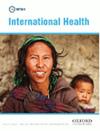将社区努力、创新的政府干预措施和数据整合到防治黑热病的斗争中:来自印度Dumka的经验教训。
IF 2.2
4区 医学
Q2 PUBLIC, ENVIRONMENTAL & OCCUPATIONAL HEALTH
引用次数: 0
摘要
黑热病是一种由白蛉传播的被忽视的热带病,主要影响印度流行地区的最贫困人口。2023年,印度通过报告实现了作为公共卫生问题的消除门槛本文章由计算机程序翻译,如有差异,请以英文原文为准。
Integrating community efforts, innovative government interventions and data in the fight against kala-azar: lessons from Dumka, India.
Kala-azar, a sandfly-borne neglected tropical disease, primarily affects the poorest populations in endemic regions of India. In 2023, India achieved the elimination threshold as a public health problem by reporting <1 case per 10 000 population at the block level across the country. Dumka, one of four kala-azar endemic districts in Jharkhand, was a significant focus of transmission and achieved the target 1 y before, in 2022, sustaining it through today. Strategic, data-driven innovative interventions addressed persistent sociocultural and socio-economic factors that were contributing to the persistence of transmission in Dumka.
求助全文
通过发布文献求助,成功后即可免费获取论文全文。
去求助
来源期刊

International Health
PUBLIC, ENVIRONMENTAL & OCCUPATIONAL HEALTH-
CiteScore
4.50
自引率
0.00%
发文量
83
审稿时长
>12 weeks
期刊介绍:
International Health is an official journal of the Royal Society of Tropical Medicine and Hygiene. It publishes original, peer-reviewed articles and reviews on all aspects of global health including the social and economic aspects of communicable and non-communicable diseases, health systems research, policy and implementation, and the evaluation of disease control programmes and healthcare delivery solutions.
It aims to stimulate scientific and policy debate and provide a forum for analysis and opinion sharing for individuals and organisations engaged in all areas of global health.
 求助内容:
求助内容: 应助结果提醒方式:
应助结果提醒方式:


